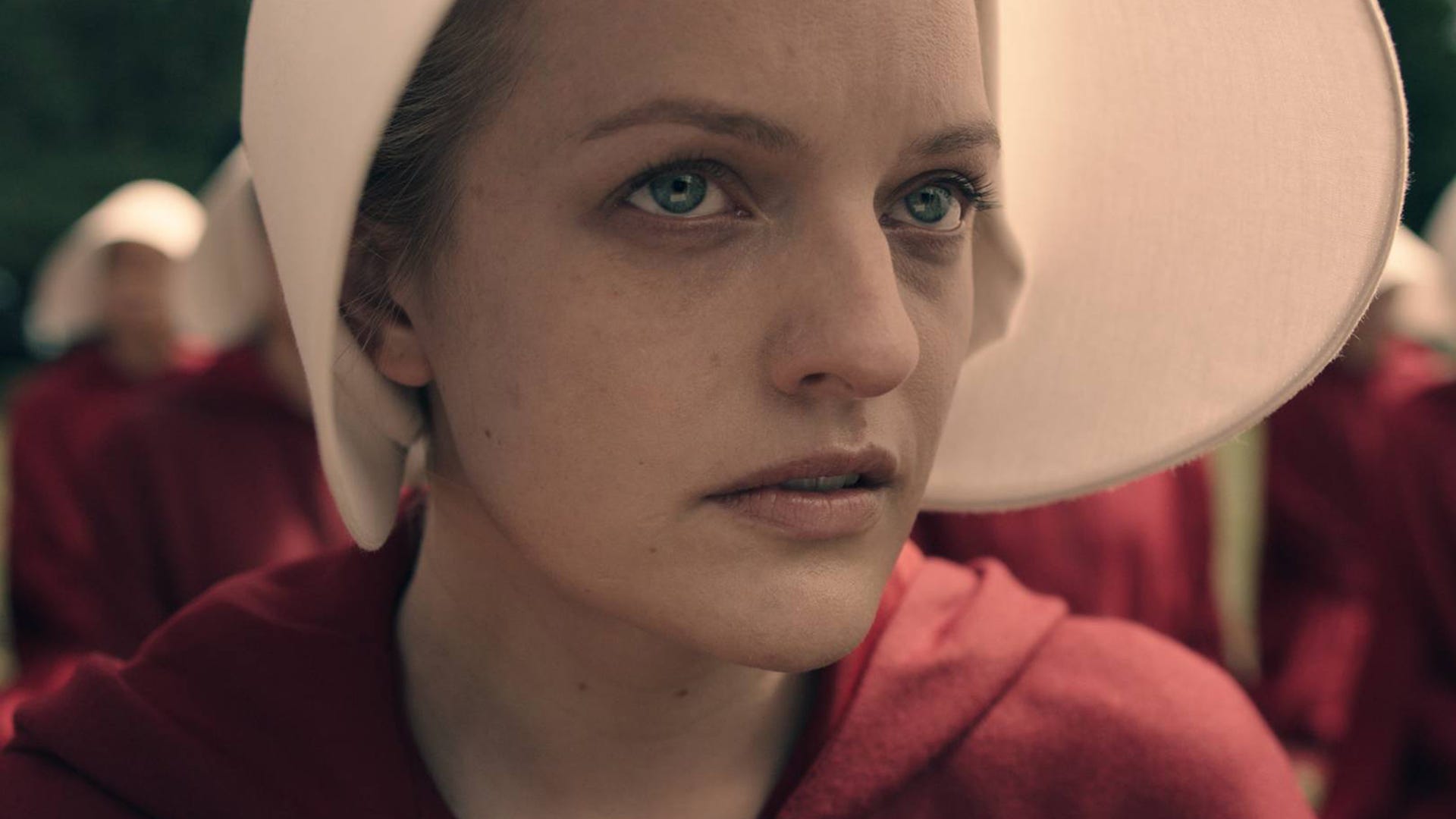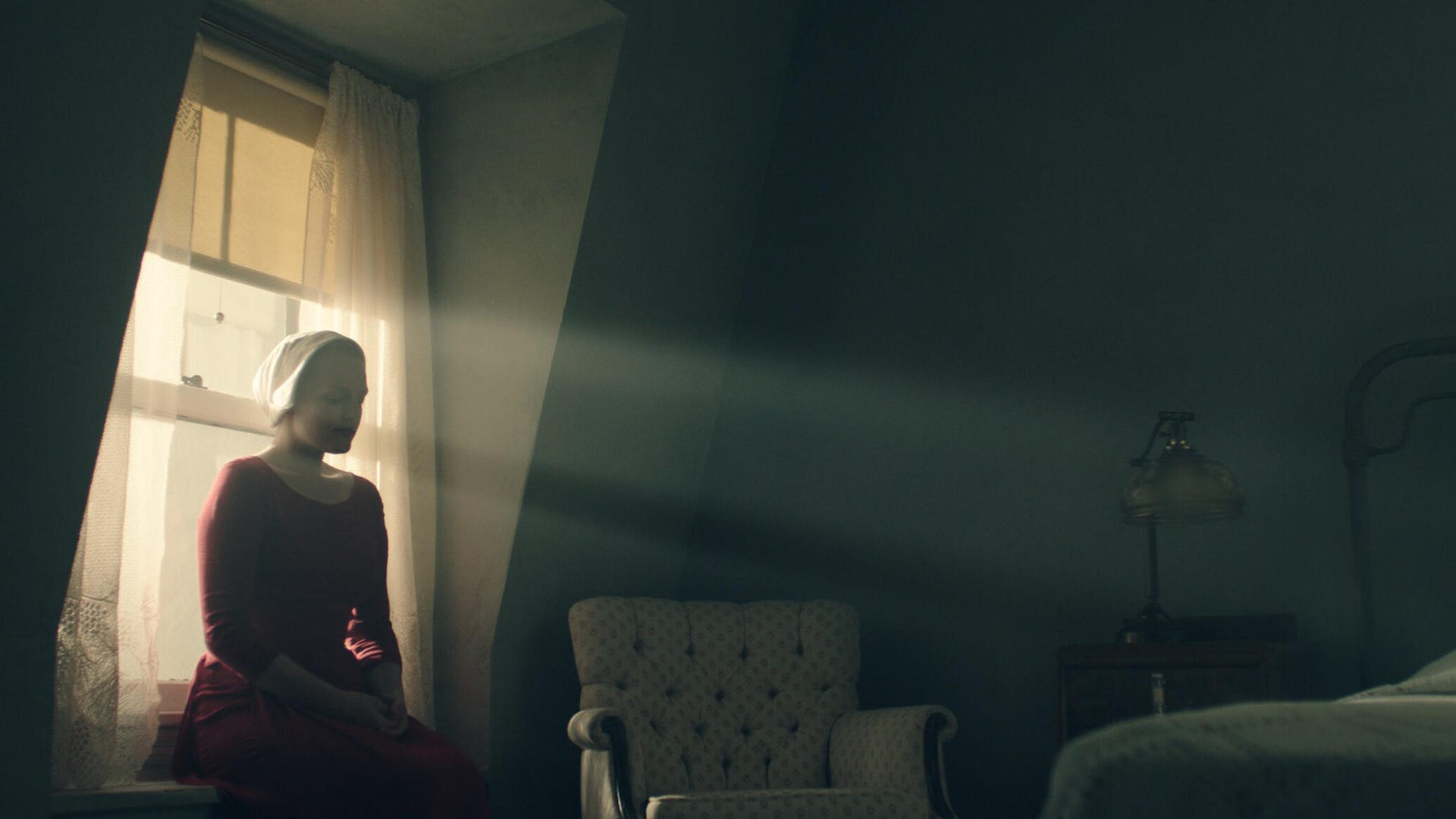Join or Sign In
Sign in to customize your TV listings
By joining TV Guide, you agree to our Terms of Use and acknowledge the data practices in our Privacy Policy.
Elisabeth Moss Hopes The Handmaid's Tale Will Leave Viewers With a Sense of Hope
The actress talks bringing Offred to life
Since Margaret Atwood published The Handmaid's Talein 1985, fans, feminists and scholars have praised the work for its compelling take on what happens when the ever-present darkness coursing through polite society breaks free from its restraints.
Set in the near-future America after a totalitarian, Christian-fundamentalist regime has taken over, both Atwood's original work and Hulu's new series depicts a world in which the few fertile women left in the country are conscripted as "handmaids" to infertile, wealthy and politically connected couples who use -- ie: sexually assault -- the handmaid in the hopes of attaining a child. Having undergone intense, fundamentalist training, the handmaids learn to repress any expression of their own hopes, dream or identity out of fear of exile or execution. Instead, they must be empty vessels through which the lord will do his work -- or at least they must do everything in their power to appear that way.
At the center of this tale is Offred (Elisabeth Moss), a wife and mother who is ripped from her former life and placed in the home of a young commander (Joseph Fiennes) and his wife Serena (Yvonne Strahovski). And while Hulu's adaptation of The Handmaid's Tale expands the story far beyond Offred's point of view, she remains the viewers' guide to this bleak new world as the audience follows her attempts to navigate the delicate social politics within the Commander's household, all while trying to maintain a sense of hope that she will one day find her daughter again.
It's an incredibly tricky role, but one which Elisabeth Moss pulls it off with ease, despite rarely being able to rely on words to express her character's thoughts or feelings."That was the most challenging thing in the beginning, but also the thing that I loved the most and really wanted to get the chance to do," Moss tells TVGuide.com. "For me as an actor, that's what you're trying to do all the time. You're trying to show two things: you're trying to show an outer life and an inner life to a character. And this is sort of the ultimate challenge in that in her outer life, she couldn't say anything about how she felt at all, mostly never. And so the inner life had to be so fraught and she's so afraid and angry and filled with such despair. So both those things, the outer and the inner, were at such extremes, and so for me, that was the exciting thing to try to do."
In order to let viewers know what Offred is feeling, Moss relies on the subtlest twitches and micro-expressions to capture the handmaid's tormented inner life while maintaining her outward façade of compliancy. Voiceover also allows viewers a glimpse into Offred's state of mind, but the times we are privy to her inner thoughts wouldn't bear nearly as much emotional weight if they weren't coupled by Moss' perfectly restrained performance. "I love the challenge of not showing the characters in the scene what you're feeling, but somehow showing the audience a little bit and letting them. For me, that was fantastic," Moss exclaims.

When Moss was offered the role of Offred, it was an opportunity the actress couldn't imagine turning down. Not only was it the lead role in an adaptation of one of the most celebrated modern feminist novels, but it was the kind of complex female role that, while they are becoming more common, are still far from the norm. "I was very attracted to the fact that she was a normal person, that she's not a heroine, that she's not a superhero," Moss says. "She's a mom, she's a wife, she's a friend, she has a job in book publishing. And she gets dropped into this world and has to figure out how to save herself and save her daughter. That was something I was really attracted to, just the central idea."
Moss also signed on as a producer on the series, which she calls "one of the most fulfilling things" about her work on The Handmaid's Tale. "I've had a chance to be involved in every single part of the show, from pre- to production to post-," Moss explains. "And as a woman in this business, I've been in it for a while, and it's really been so creatively satisfying to have a voice."
Because of her role as a producer, Moss got the opportunity to help direct how the show tackled her character's repeated sexual assaults -- a topic many shows struggle with that is made that much more complicated by Offred's learned silence. But while Offred approaches these monthly rapes with a sense of resignation and never attempts to say no, Moss and the other producers wanted there to be no confusion: "It was very, very important to us that it was a sexual assault," Moss says. "That no part of it was at all depicting anything involving love, anything involving lust, sex, anything. It had to be clinical; it had to be real and brutal, but only in its clinical-ness."
During the rape scenes, in which Offred is cradled, fully dressed, between Serena's legs while the Commander dispassionately pumps away, there is a feeling of numbness and detachment that is a far cry from the depictions of sexual assault you've seen before. These scenes are matter-of-fact, while still giving glimpses into the pain Offred (and Serena) feel about the ritualistic rape that has become the new normal. "We didn't want to disturb anyone to a degree that was gratuitous. But at the same time, we wanted it to be exactly what it is. Nothing pretty on top to make it any better," adds Moss.

Although the subject matter of The Handmaid's Tale is incredibly dark and, perhaps for some, all too relevant to our own world to bear, Moss believes that the series will leave viewers with a sense of hope. "That was something that was really important to us," she explains. "We wanted it to be real, dark, in your face. We wanted it to be realistic and not shy away from anything. We also didn't want people to feel like there wasn't a chance, because the central character is somebody who is inspiring in the sense of she will not give up no matter what happens."
But while The Handmaid's Tale does aim to show viewers that a world like Gilead isn't necessarily inevitable, neither does the show dance around how easily our society could devolve into the misogynistic near-future of Atwood's work. It's both a warning and an escape, Moss explains. "The awareness of what's happening around you is so incredibly important and the fact that people looked away before Gilead happened is how they got into Gilead. The fact that they weren't aware of what was happening and they didn't have the truth being told to them. And so I think that both messages are important."
Hulu's The Handmaid's Tale premieres its first three episodes on Wednesday. Beginning the following week, it will release new episodes weekly.
